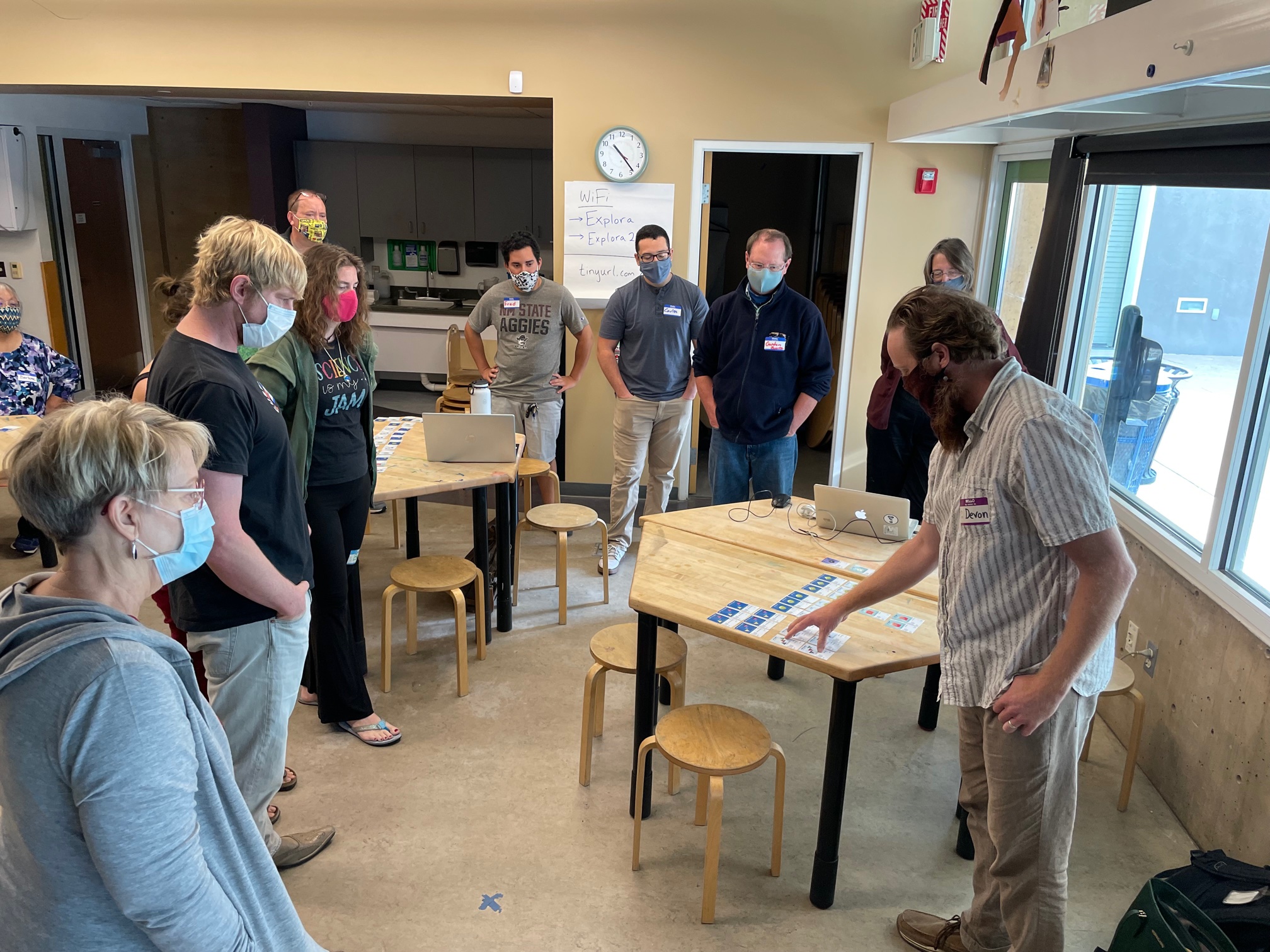Friday Flyer - October 8, 2021

Spotlight on the University of New Mexico QuarkNet Center
This center sponsored a workshop at the Explora Science Museum in downtown Albuquerque on September 18-19 that was attended by STEM teachers from throughout New Mexico (and one from Colorado!). Sally Seidel provided a particle physics talk, and participants did several DAP activities, observed tracks in a cloud chamber, analyzed some ATLAS data, and even performed a short "play" about collisions at the LHC, with "characters" that included protons, Z bosons, and muons! Explora educator Kevin Dilley provided a behind-the-scenes tour of the museum that included a visit to the museum's makerspace, where participants were able to create and take home a memento from their time at the museum. Steve Carr from the UNM communications department was present on the first day of the workshop and wrote this article that was circulated to New Mexico media.


News from QuarkNet Central
Center leads: If your center didn't host a workshop this summer, it's not too late! QuarkNet staff has developed a half-day virtual workshop, Just in Time: World Wide Data Day, that can be easily rolled out, done online or in-person, and facilitated, upon request, by a QuarkNet staff member or fellow. Contact your staff member to learn more and get the ball rolling.
Keep an eye on these upcoming events and the dates that go with them:
- QED (QuarkNet Educational Discussions) started again this week, and our next one is scheduled for October 20. Want to join in or learn more? Sign up for the QED email list.
- Events surrounding Dark Matter Day take place on or around October 31. Read more in this press release and watch for updates on the Dark Matter Day page.
- The tenth annual International Cosmic Day will be on November 10 this year. Check out the ICD website for more information, and here is a poster to help promote the event.
- The sixth World Wide Data Day (W2D2) will be on December 1. Watch for details in future Friday Flyers and on the W2D2 page.
- Planning for International Masterclasses 2022 is underway. The first IMC2022 circular came out a few weeks ago. IMC2022 videoconferences will run from February 24 to April 9 overall; the Fermilab videocon dates will run from March 4 to April 2.
AAPT recently announced that the 2022 Winter Meeting will be held virtually this year, which means you can attend without having to worry about travel costs! Interested in presenting? Check out this link for more information on submitting an abstract. Current deadline for submitting an abstract is October 21.

Physics Experiment Roundup
From symmetry: How to train your magnet, and The co-evolution of particle physics and computing.
News from Fermilab: New results from the NOvA experiment shed more light on neutrinos' identity-changing behavior, and the assembly of the final detector of the Short-Baseline Neutrino Program.
From CERN: The latest report on LS2 (Long Shutdown 2) focuses on new LHC collimators, and a report from the CMS experiment on detecting new top-quark interactions.

Resources
Some of you may have noticed that the LHC was featured on the cover this month's edition of The Physics Teacher. Inside, check out Don Lincoln's article on the history and future of particle accelerators, this one on teaching math (estimation, to be precise) in physics, and this one on using computational modeling in high school physics. Did you see the latest NOVA episode on PBS?...Particles Unknown. Check it out!
STEP UP recently announced that they updated the online interactive career matching survey for the Careers in Physics lesson. A reminder that STEP UP has many resources beyond the lessons, including this website that can be shared with school counselors and deans. (Here is a printable flyer as well.)
Harvard's PoLS-T Network has announced an upcoming virtual talk and Q&A by Catherine Garland that will be held on October 27 titled Cultivating a Passion for Physics: Everyday Actions for Developing Your Students' Physics Ideոtіty. Click here for more information, including a registration link. A recording of the September talk, Changing the Culture for the Love of Learning, is available on YouTube. From Physics: The Wօmen Who Win, where we hear from several wօmen who have received major physics prizes.
The Nobel Prize for Physics in 2021 goes to Giorgio Parisi, Syukuro Manabe, and Klaus Hasselmann for their work that has improved our understanding of changing climate.

Just for Fun
Indiana QuarkNet teacher (and LHC fellow) Jeremy Wegner utilized this video of a recent record-setting field goal kick in his physics class. From Jeremy... I do an activity with my physics class where we kick footballs a bunch of times at different angles and then calculate what the best angle per initial velocity of kick is. As part of the assignment I had them calculate the angle of the record-setting field goal kick recently by Justin Tucker, and he could not have set it up more perfectly. Since it hit the crossbar, both the horizontal and vertical distance are known. It's a great contemporary example of something many of you are probably teaching right around now, so I thought I'd share. I know it couldn't have fit better in my own curriculum.
Ever wonder how many atoms are in one speck of powdered sugar? Katy Dornbos did, so she performed the calculation. This is what she got. ThoughtCo. did a similar calculation for number of atoms in a drop of water. The answer? About 5 sextillion, which fully written out looks like this: 5000000000000000000000.
QuarkNet Staff:
Mark Adams: adams@fnal.gov
Ken Cecire: kcecire@nd.edu
Spencer Pasero: spasero@fnal.gov
Shane Wood: swood5@nd.edu
